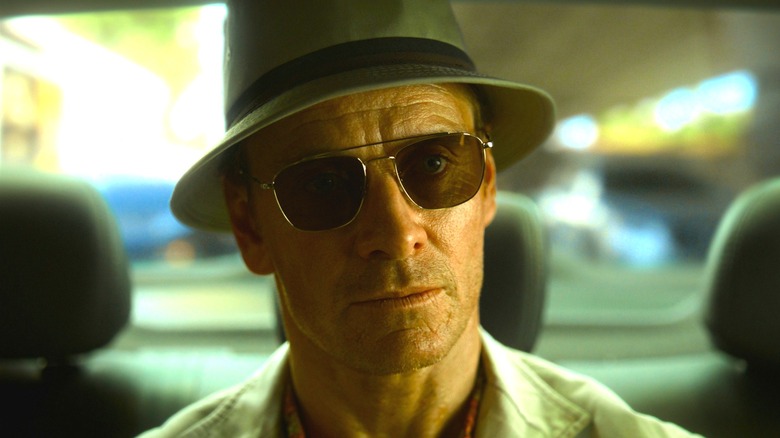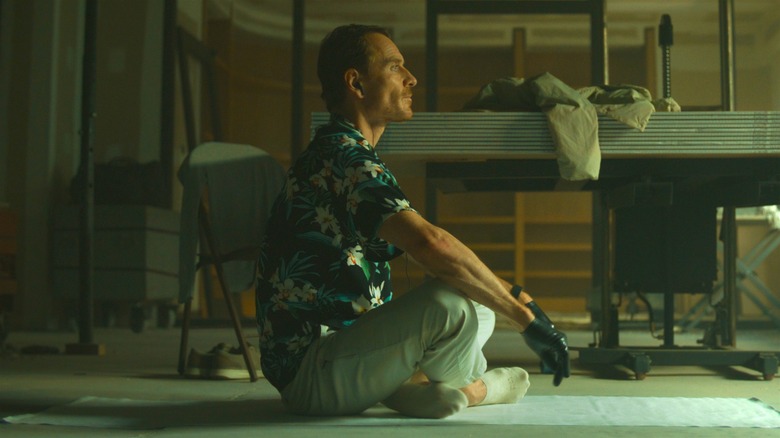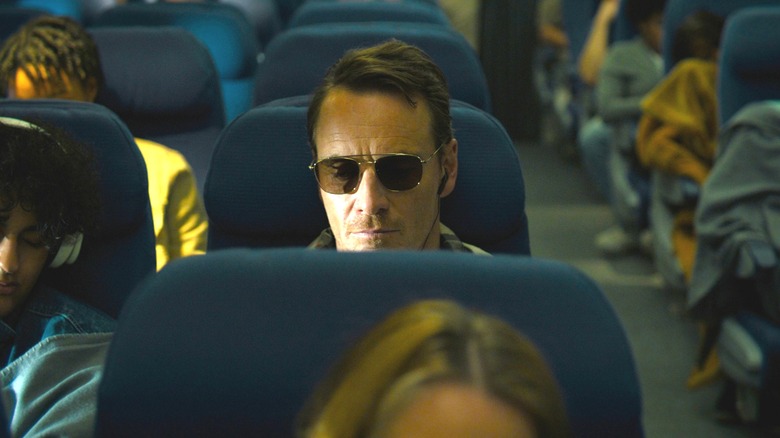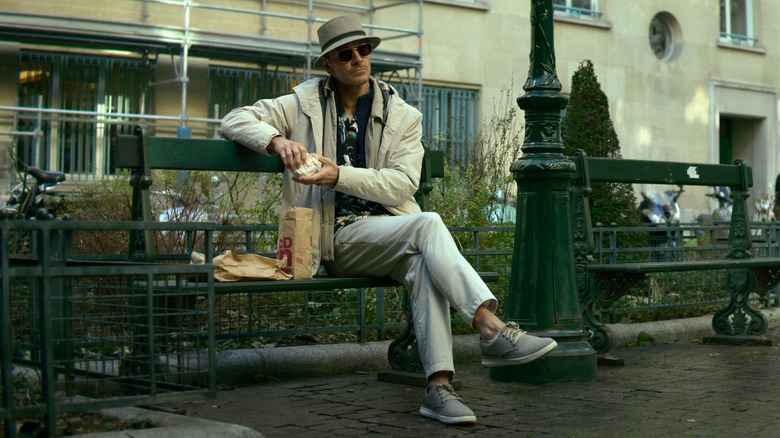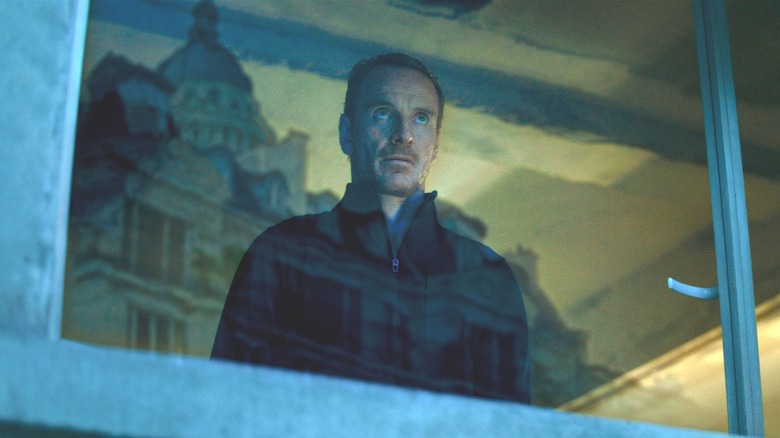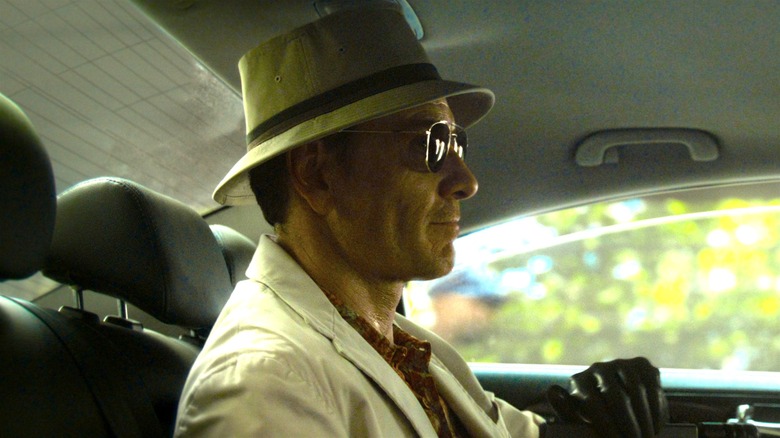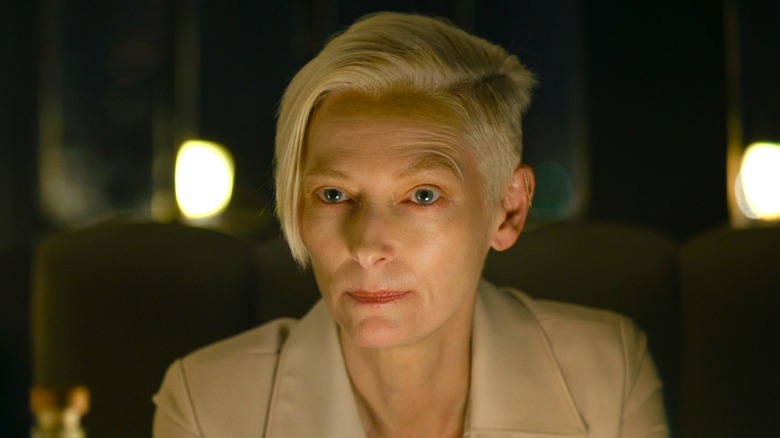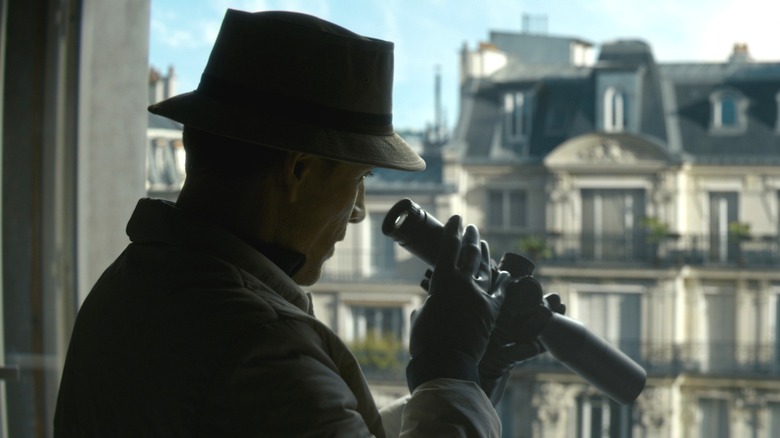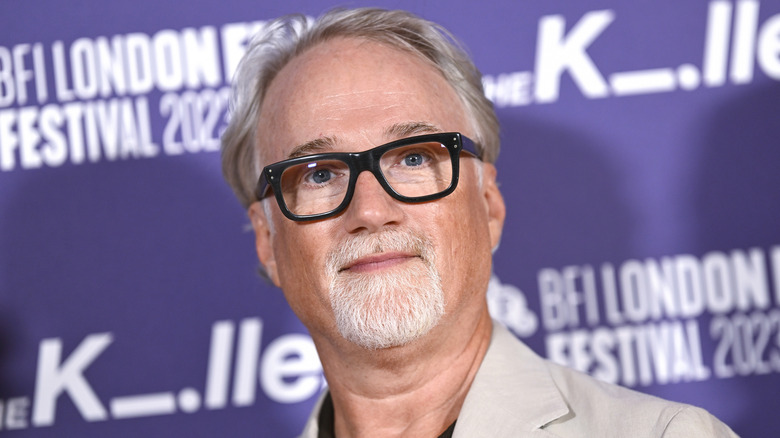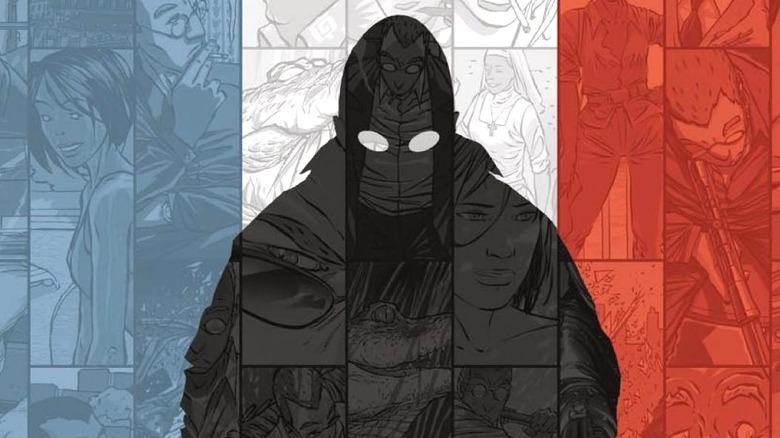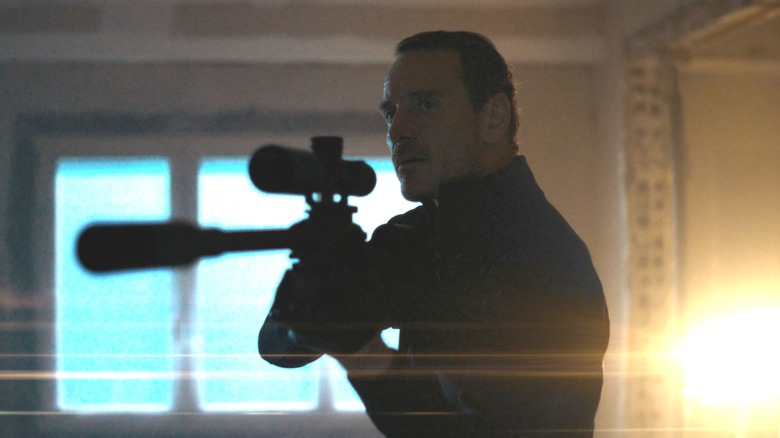The Ending Of Netflix's The Killer Explained
Contains spoilers for "The Killer"
What makes a hitman tick? This is the question asked by David Fincher's "The Killer," a neo-noir crime thriller about a paranoid assassin. Michael Fassbender stars in the titular role, bringing the otherwise nameless killer to life. He's a man who lives by a strict code — until a botched shot at a big-time target reveals just how much madness is really in this killer's method. While the premise promises a pulpy revenge tale and the trailers drip with style, "The Killer" is as lean as the protein-heavy diet its protagonist consumes.
However, for all its taut and trim storytelling, "The Killer" — a mostly bleak but oddly funny film — leaves a lot out there. At its heart, it's a study in contradiction and the futility of the pursuit of perfection. It's also an incredibly tense film from start to finish, and the ending is open to some interpretation. If you want somebody to explain the ending of Netflix's "The Killer" to you, then look no further, because we've taken a deep dive into the film's finale.
What you need to remember about the plot of The Killer
"The Killer" opens with the eponymous hitman killing time on the top floor of a rented WeWork office in Paris. His target is a big-wig in a rooftop suite on the opposite side of the street. The Killer narrates about his abilities the same way he exercises them: evenly. This isn't an excitable man. He's paid well not to care about the consequences of his job. We know this because the Killer tells us himself. Everything we know about the Killer comes from his inner monologue or what we learn from watching him watch others.
He's fit, he's well-disciplined, and he's not one of the "many," but one of the "few." However, when he misses his shot and kills his target's lover instead, the Killer's face flashes with panic. A chaotic scene ensues and the Killer flees. He ditches his weapon and identity, donning a disguise and arranging a flight to the Dominican Republic. It's a place the Killer calls home, but he's in for a shock when he arrives.
The Killer discovers that his girlfriend Magdala (Sophie Charlotte) has been beaten within an inch of her life by two other hitmen as punishment for him failing to neutralize his target. He gets genuinely emotional — which we already know is not like him — when she tells him that she didn't reveal his secrets. All of a sudden, the Killer cares about consequences. He sets out on a revenge blitz, vowing to make everyone involved in Magdala's attack pay the ultimate price.
What happened at the end of The Killer?
The Killer begins to methodically hunt down his enemies, with his mysterious employer Hodges (Charles Parnell) firmly in his crosshairs. After dispatching Hodges, the Killer gets his secretary Dolores (Kerry O'Malley) to reveal which client ordered the hit on him and what lackeys ended up hurting Magdala instead. After the Killer gets these names, he breaks his "forbid empathy" rule and agrees to Dolores' last wish: He makes her death look "right." Well, as right as falling down the stairs to a tragic end can look.
He then heads to Miami and battles it out with one of Magdala's attackers, a man known as the Brute (Sala Baker). After killing him, the Killer seeks out the other attacker. The Expert (Tilda Swinton) attempts to win the Killer over with a bawdy but meaningful speech. When that doesn't work, she tries to stab him, but it's too late to alter her fate. He isn't called the Killer for nothing.
Next, the Killer stalks the Client, a man named Claybourne (Arliss Howard), through Chicago. Finally, the two face off. Claybourne explains that Hodges encouraged him to pay an extra fee to take the Killer off the board for botching the job and that it was nothing personal. The Killer seems satisfied with this, but warns Claybourne that if he has to come back, he won't go so easy. The Killer leaves, decides that he is one of the "many" after all, and hangs out with Magdala. To paraphrase his favorite song by The Smiths, he's human and he needs to be loved, just like everybody else does.
What does the ending of The Killer mean?
The first thing we learn about the Killer is that he's as cool, calm, and collected as they come. He rides a motorcycle through Paris after missing his mark without breaking much of a sweat. He starts the movie smug about being one of the "few," but he ends it admitting that he's really one of the "many," and that's not the only change. Though we only get little glimpses into the Killer's personal life, it becomes increasingly clear that his work is really starting to get to him. You can see it when he wells with emotion at the sight of Magdala, when he hesitates with Dolores, when he allows the Expert her dessert, and when he doesn't murder the man he's spent almost the entire movie planning to kill.
While it might not show in the obvious ways, the Killer is clearly cracking under the pressure of being such a heartless killing machine. Coming back to his lover and finding her beaten half to death is the straw that breaks the camel's back for him, tipping him over the edge. But, under all the rage he feels, there's something else — he starts to believe that there's a chance for a "normal" life with the woman he loves. That's why he spares Claybourne at the end of the movie and kicks back with Magdala in the Dominican Republic. It may be a slick and stylish movie, but the message behind "The Killer" is really a simple one: It's never too late to change your ways.
Another explanation for the ending of The Killer
There's a much colder way to read the ending of "The Killer." After all, it doesn't make a lot of sense that the Killer would spare Claybourne for a chance at a happily ever after that may not actually be forever after. What's to stop Claybourne from hiring another hitman to come after him and Magdala? Even if he's had a change of heart, it's a huge loose end to leave for someone so methodical. However, sparing Claybourne might make professional sense for the Killer. Perhaps he's not ready to retire after all?
The Killer proves himself capable of carefully weighing his options throughout the film. Maybe his final showdown with Claybourne is less about empathy and more about the benefits of not killing a potential client. Eye-for-an-eye revenge might make sense in the world of murder for hire, but only up to a point. If it gets out that the Killer is audacious enough to kill a well-paying customer, especially one who was given bad service, then there's little chance of him being able to pick up more work in the future should the need arise. Is he really showing empathy at the end, or is he just playing the long game?
What do The Killer's commandments really mean?
Is the Killer actually good at his job? Can anyone be "good" at a job like that? The Killer's endless inner monologue always turns back to a mantra-like repetition of his code. "Stick to your plan. Anticipate, don't improvise. Trust no one." The Killer recites his commandments to himself over and over again throughout the run of the film, but not so much at the end of it. Why? He seems to believe in everything he's saying — until the reality of his work follows him home.
"Fight only the battle you're paid to fight," the Killer also says. "Forbid empathy." He breaks his own rules in the movie's closing act. The only reason he's on his revenge quest in the first place is because empathy for his lover has made a mess of his previously organized worldview. He stops fighting the battle he's paid to fight and starts fighting his own battle.
"This is what it takes," he states at one point. "What you must commit yourself to if you want to succeed." Succeed at what? The Killer doesn't succeed at his ultimate goal of taking down Claybourne at the end. Maybe he gets something better with Magdala — and maybe he gets some relief from the constant inner monologue that demands he be controlled and unfeeling at all times, even in the face of violence.
What does Tilda Swinton's speech mean in The Killer?
The Killer's penultimate kill is possibly the most stylish and evenly matched in "The Killer." Of course it is — when you come for Tilda Swinton, you better not miss. But what is her elegant killer character, the Expert, going on about during her last meal, with all that talk of bears and hunting? And what bearing does her speech have on the ending of "The Killer," you may be wondering?
While downing whiskey and longing for life's uneaten ice cream, the Expert tries to buy time (and the Killer's camaraderie) with a fable. It's a filthy, funny, bizarre story about a bear and a hunter who doesn't seem to really want to kill the bear — he just loves the hunt. The Expert draws this comparison between the hunter, the Killer, and herself in a last-ditch effort to connect with the Killer and save her skin.
This work they do is nothing personal, but they love it. They can't stay away from it. How could the Killer really blame her for what she has done? He would have done the same thing. This illumination doesn't save the Expert's life, but it buys her some time. The moment where the knife falls from her dead hand is further proof that the moral of her little story is true: She and the Killer can't really resist the hunt, even at the bitter end.
Why are The Smiths important in The Killer?
The Killer is an obsessive, meticulous man, even when it comes to music. He clearly loves The Smiths, but why is the British band's music (aside from a killer score by Trent Reznor and Atticus Ross) the only music in the movie? The Killer is cool, at odds with the world, and a little smug. So are The Smiths. Lead singer Morrissey is as famous for his ornery takes as he is his legendary croon. Like the Killer, he's one of the "few."
The lyrics also match the cynical wit of the titular character. There's just something cheeky about hearing "Sweetness, I was only joking when I said by rights you should be bludgeoned in your bed" as the Killer mulls over his decisions toward the end of the film. David Fincher agrees, saying at the Venice International Film Festival (via Variety), "We don't get an awful lot of access to who this guy is, and I thought through his mixtape, it would be amusing that that would be our window into him."
One of the few things we know about the Killer's personal life is that he exclusively listens to The Smiths on the job. That's commitment. It's also bound to make even a cold man feel deeply — The Smiths can be cynical, yes, but there's a lot of heart in their music. This calls to mind a major theme bubbling in the belly of the movie: What happens when emotion collides with precision? Plus, certain lines from the songs he listens to seem tailor-made for him and his arc, such as, "It's gruesome that someone so handsome should care."
Who is the Killer actually talking to?
While there is very minimal dialogue in "The Killer," we hear an almost constant inner monologue from the Killer himself, all the way through to the end of the film. But this monologue isn't revelatory in regard to the Killer's actual life. There's a performative quality to his words, but who is he performing this inner monologue for? Himself? Or someone else?
These are questions that "The Killer" cinematographer Erik Messerschmidt had as well, so he called David Fincher for guidance. "He sent me this film called 'Le Samourai' to watch and told me this is a film about someone's process, being an objective ghost in the room," the longtime Fincher collaborator told Total Film (via GamesRadar), adding, "This is someone who never allows anyone to be close to them, but suddenly you are there — what does that feel like?"
There is also something compulsive about the Killer's endless monologuing that goes beyond explaining himself to ghosts. From his running commentary to his little jokes, it seems the Killer is trying to convince himself that he's happy with his life as a hired gun — and, by the end of the film, it's an argument he's losing.
What has David Fincher said about the ending of The Killer?
If viewers find it hard to relate to the Killer's plight, or even his happily ever after, well, that's kind of the point. "Sympathy was the last thing on my mind as it relates to this character," Fincher said at the Venice International Film Festival (via Variety), adding that the main character "didn't need to be frightening." The three-time Oscar nominee went on to reveal how he wanted people to feel when the credits were rolling: "My hope is that someone will see this film and get very nervous about the person behind them in line at Home Depot."
Fincher is infamous for his attention to detail, meticulous approach, and commitment to capturing the full scope of his vision. "Seven" scribe Andrew Kevin Walker is also the screenwriter behind "The Killer," and you could argue that the Killer's inner monologuing pokes fun at Fincher's directorial persona. If this is the case, does that mean the ending of "The Killer" tells us that the filmmaker is ready to slow down in his professional life, too? That's not likely. "I can't really work another way," Fincher told The Guardian. "I just feel like time in front of the camera with the actors is what we're here to do. Everything else is nonsense."
Speaking to Radio Times, cinematographer Erik Messerschmidt revealed that Fincher enlightened him when he asked what "The Killer" was really trying to say. "I needed some clarification from him," Messerschmidt said. "You know, is this about sociopathy? Is it meant to be really exciting? What are we...? And he said, 'Don't look for the theme. The film is about process, about process and procedure.'" The Killer is still the same methodical man by the end of the movie, he's just channeling that energy elsewhere.
The Killer is based on a French graphic novel
"The Killer" is based on a series of French graphic novels, also titled "The Killer" — or, in French, "Le Tueur." Illustrated by Luc Jacamon and written by Alexis "Matz" Nolent, the series began in 1998. Just like the film adaptation, the graphic novel's Killer is a stylish, stoic, and very well-compensated hired gun. While still minimalist and narrowly focused, the comic explores the Killer's work and love life slightly more. Also low on dialogue and high on inner monologue, it hits similar themes to the movie, but in the comic, the Killer has at least one friend and a little more weighing him down.
Claire Napier, writing for WWAC, identified another key similarity between "The Killer" and the comic in a review of the source material. "The most fascinating thing about 'The Killer' is how adeptly Matz and Jacamon manage to present a vision of a man who instinctively feels more than he's willing to proactively feel." This is the crux of Fincher's film. By the end of the movie, the Killer has processed these new feelings and decided that they aren't necessarily a bad thing.
What the ending of The Killer could mean for the franchise
Could the Killer return in a sequel film? He thinks he's gotten out of the game, but what he's actually done is killed a bunch of its major players, terrified a client (but left him alive), and made untold enemies in his line of work. There could be a franchise in the making, similar to the way a whole world sprang up around "John Wick" after the Keanu Reeves action flick became a big hit. The graphic novel series that the film is based on is huge, so there are plenty of storylines to pull from.
It would be fun to see Tilda Swinton return, perhaps as the Expert's twin sister. She was one of the best parts of the film and giving her character a twin sets up a perfect revenge plot. Her thirst for vengeance might just be the thing that cracks the Killer. Or, a sequel could go down the "Taken" route: Instead of the Killer's girlfriend getting hurt, she gets kidnapped. It's exciting to think about shaking up the can of assassin soda that is "The Killer," but David Fincher doesn't really do sequels, so a follow-up is pretty unlikely.
